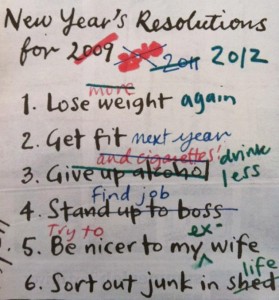Statistically most people who start new year’s resolutions drop them by the third week. Regardless of whether it’s because they take on too much or go into them with good intentions but little knowledge of how to achieve them, people need not abandon their resolutions so easily at the first obstacle.
How can such apparently strong determination fizzle out so quickly?
Let’s first examine the psychology of the New Year’s Resolution.
During the month of December people tend to overindulge in eating, drinking, spending money and neglecting exercise. Rather than moderate these behaviors, we promise ourselves that after the holiday season is over, we will definitely take control. In the meantime, we give ourselves permission to overindulge without guilt.
 Our resolve is at its peak when we feel full, drunk, or broke. It’s easy to think about going on a diet as we groan from a bloating holiday meal. It’s no problem to plan to quit smoking when we’ve just had a cigarette and replenished our nicotine level. At this point we feel confident about our New Year’s resolutions because we have not yet confronted any prolonged physical deprivation or discomfort.
Our resolve is at its peak when we feel full, drunk, or broke. It’s easy to think about going on a diet as we groan from a bloating holiday meal. It’s no problem to plan to quit smoking when we’ve just had a cigarette and replenished our nicotine level. At this point we feel confident about our New Year’s resolutions because we have not yet confronted any prolonged physical deprivation or discomfort.
In early January, we are often so sick of rich food and drinks, and feeling so sluggish from lack of vigorous physical activity that it’s not difficult to abstain from overindulgence. In fact, some people look forward to more structure and discipline in their lives. However, a few weeks into the new discipline, our appetites have returned, and we start to feel deprived. It is at this point that we are most at risk for reverting back to old behaviors.
Soon we start rationalizing that this is not a good time of year, what with cold weather and our numerous obligations. When spring comes, we’ll really get into shape. Thus, we make another promise to ourselves, and, now free of guilt, put off habit change for another few months. Chances are that when spring arrives, we will have another temporary surge of motivation, only to abandon it within a few weeks.
Why do people abandon their resolutions?
One reason is that we become discouraged when results don’t come quickly enough, or when we find that we are not necessarily happier because of them. Behavioral change requires sustained effort and commitment. It is also typically accompanied by physical discomfort. For example, reducing food, alcohol or nicotine intake from a level to which you have become accustomed, results in cravings. Forcing yourself to get off your cozy chair to exercise is often difficult when you’re tired. And of course, it’s easy to procrastinate until tomorrow, so that you can rationalize not disciplining yourself today. Are you having trouble developing healthy habits, or making better choices? Maybe you need help developing a realistic “plan of action”.
Below are suggestions on how to turn things around this year and stay focused.
 Decide on just one resolution
Decide on just one resolution
It’s common practice for people to come up with a large collection of resolutions. Big mistake! You simply can’t give 100% commitment to your efforts if it is all spread out between a number of goals. Furthermore, as soon as you hit a rough patch with one resolution (and you surely will), the resulting drop in focus and motivation will have a knock-on effect on your other resolutions. So determine which resolution is most important to you and will make the largest difference to your life, then concentrate purely on that one.
Why did you drop your resolutions? What got in the way? There is no point starting up your efforts again if you don’t deal with the immediate obstacles in your way. It could be something as simple as having taken on too many goals (as discussed above), a lack of understanding of effective habit building practices, or it could be something much deeper. For instance, you may be trying to quit smoking yet you are surrounded by fellow smokers all day. Alternatively, you may want to lose weight but you still have a fridge full of burgers and chips.
Break down the resolution into small chunks
View your new year’s resolution with a different perspective. Consider it as a project and break it down into appropriate next actions. That way you will have a much more clear idea of what you are trying to achieve and by having the resolution broken down into manageable chunks you only need to take on as much as you can manage.
Break the timescale down too. Just because it’s a new year’s resolution, doesn’t mean you have to think in yearly terms. If you have a resolution to regularly go to the gym, think about what a reasonable target would be weekly. For instance you could start off aiming to just go to the gym once a week and then when you are settled with that, expand to two days a week.
Accept that you will stumble along the way
Resolutions aren’t an all-or-nothing situation. However, because they are viewed as a once a year deal and get covered so often in the media around the holiday season, they can get built up in people’s heads leading to overly optimistic expectations. It’s important to be realistic about your resolutions and realize that you will come across hurdles along the way.
 Making a Plan You Can Stick With
Making a Plan You Can Stick With
Once you set more reasonable goals, focus on a specific plan to reach those goals.
Start a checklist to help you set short and long term goals as well as plan for any obstacles that may stand in your way. Deciding your strategy for getting past obstacles ahead of time will increase your success rate. When it comes to changing something in your life, there’s nothing magical about a new year. It’s important to remember that you can work on these changes throughout the year and what gets you there are the little things you do each day.
Find some way to be healthy today and then do the same thing tomorrow…before you know it, you’ll be well on your way.



